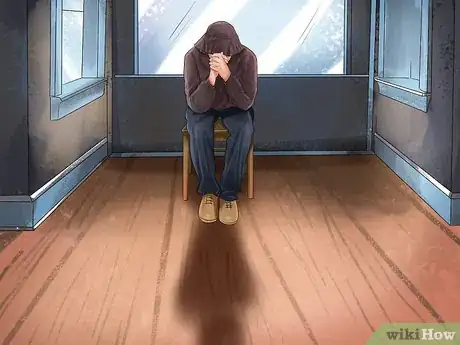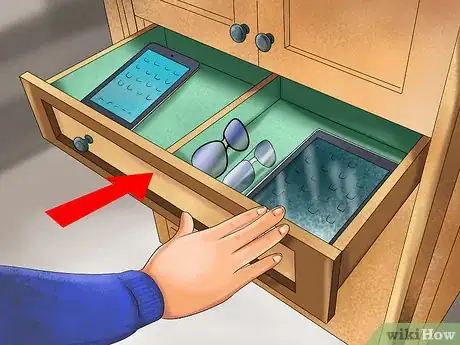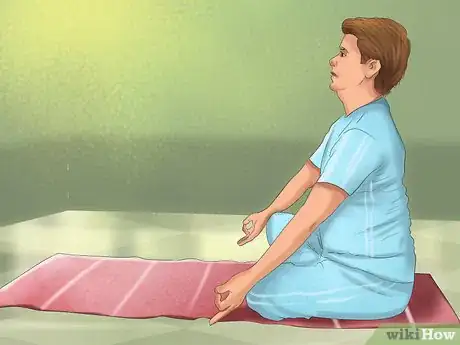wikiHow is a “wiki,” similar to Wikipedia, which means that many of our articles are co-written by multiple authors. To create this article, 9 people, some anonymous, worked to edit and improve it over time.
There are 7 references cited in this article, which can be found at the bottom of the page.
This article has been viewed 112,058 times.
Learn more...
There are many benefits to solitude. Spending time alone allows you to unwind and reboot your brain. Time alone to think can allow you to more effectively think through your problems, finding solutions you may have previously overlooked.[1] Some people are simply less social and value solitary pleasures and pursuits. If you're more introverted, leading a reclusive life is not necessarily damaging.[2] However, low levels of socialization can be a sign of depression and other mental health disorders. Make sure, even when spending much of your time alone, that you pay attention to your mood. Seek professional help if you find yourself growing depressed.
Steps
Spending Time Alone
-
1Prepare yourself for some fear. Spending time alone is scary for many people. In our modern era, we're more interconnected than ever. If you want to take some time to be reclusive, there will be an adjustment period. You may feel scared or confused when you first begin spending time alone.
- Try to push past any negative thoughts as you begin transitioning into spending more time alone. Remind yourself that you may feel some discomfort at first. However, also remember the benefits of alone time. You may be able to effectively work through certain problems or focus on certain creative pursuits if you give yourself time alone. These benefits are probably worth the initial adjustment period.[3]
- If you feel very afraid at the notion of spending time alone, consider the root of this fear. Are you afraid of loneliness or is there something deeper at play. Bad past experiences can sometimes make a person hesitant to spend time alone. You may not want to let your thoughts wander to negative aspects of your past.[4]
-
2Explore new hobbies. Use your alone time wisely. It's easy to fall into a rut if you're choosing to keep your free time all to yourself. Instead of binge watching TV shows or sleeping all day, try to take up some new hobbies. Choose hobbies you can do by yourself.[5]
- A lot of your initial aversion to alone time may stem from boredom. If you don't have a lot to fill your time, you may feel very bored or frustrated when you're alone. Taking up a hobby can help combat boredom. You'll have something to do with your newfound free time.[6]
- Remember, a hobby does not necessarily have to constitute a passion. Many people are wary to try solitary hobbies like drawing, painting, music, or writing. However, you're not trying to be a concert pianist. You're just trying to play the piano in your free time for your own amusement.[7]
Advertisement -
3Get creative. Many people choose the life of a recluse to fuel their own creativity. Without the distractions of socialization, you can focus more on your own creative work. If you're a writer, painter, sculptor, or any other creative type, use your reclusive nature to better your work.
- Alone time forces you to think deeply. The most interesting art, writing, and music asks difficult questions about the nature of human existence. If you're constantly filling your time with distractions, this can inhibit your creativity as it stops you from considering deeper aspects of existence. If you're alone, you'll have more time to ponder.[8]
- You can also take your alone time as an opportunity to learn things that will enhance your work. If you're writing a memoir, for example, learning from other authors is important. If you've never had time to read all of Proust's work, your newfound life as a recluse can allow you to do so.
-
4Disconnect from technology. If you want to be reclusive, you need to disconnect significantly. This means avoiding your phone and computer, as these devices allow you to connect with others. It's a bad idea to completely cut yourself off. If there's an emergency, for example, it's important to be able to get help. However, try to consciously disconnect from technology for a bit each day. Set aside a few hours each day to turn off your smart phone and power down your laptop. Take this time to simply be alone with your thoughts.[9]
-
5Think back to childhood. Part of what makes being alone hard is that troublesome, unwanted thoughts can creep in if we're alone for too long. You need to have some ability to self-soothe. Thinking back to your childhood can help. As children are frequently navigating new and difficult thoughts for the first time, they often have better self-soothing rituals than adults.[10]
- Try to remember how you relaxed as a child. Even silly rituals, like daydreaming, can be helpful to relax if you spend a lot of time alone.
- If you had a happy childhood, you're more likely to be good at self-soothing. If your basic needs were met as a child, you viewed the world as a mostly safe, trustworthy place. However, if your needs were not met as a child, you feel insecure in the world. You may have a need to bring others into your space in order to soothe yourself.[11]
- If your childhood was unstable, consider seeing a psychiatrist to talk through these rituals. It may be harder to be reclusive if you lack the ability to soothe yourself.
-
6Spend time outdoors. Many reclusive people have a fondness for nature. The free space of nature enhances your ability to be alone with your thoughts. It can remove certain temptations, like modern technology, that prohibit your ability to embrace solitude.[12]
- Many people enjoy activities like hiking and camping alone. As long as you're experienced enough to understand safety precautions, look into taking an occasional weekend hiking or camping trip by yourself.
- However, if you're not an experienced outdoors type, camping alone may be dangerous. Instead, try going for long walks in the woods by yourself. If you live in a rural area, just sitting in your backyard can help you feel alone in nature.
Sustaining Yourself
-
1Find work you can do at home. If you want to be a recluse, you may be hesitant about working outside of your home. With modern technology, there are many jobs can you can easily do from home if you have a laptop and an internet connection.
- Freelance writing jobs are often done at home. There are also many jobs, like transcription work, that can be done from home. Many companies hire web designers to work from their own house. Also, a lot of call center type jobs are handled at home. You can be a customer service representative at your own house, taking calls on behalf of a business as they come in.[13]
- If you have a specialized skill set, consider working for yourself. This does not necessarily mean starting your own business. You could do freelance work from home for clients. If you have a writing degree, for example, you could look into freelance editing.
-
2Find creative ways to shop. If you want to become particularly reclusive, you may be hesitant to leave your home even for things like grocery and clothes shopping. If this is the case, find creative ways to stay at home.
- In the modern world, almost everything you need can be ordered online. Clothing, books, food, and other items can be ordered from websites like Amazon. You may cringe at the delivery fees, but remember you're staying home most of the time. While you may spend $10 for shipping and handling, you're not spending money on gas or public transportation.
- If you don't want to order everything online, consider avoiding people in other ways. You could shop during hours of the day where stores are unlikely to be crowded. For example, try going clothes shopping at 1 o'clock in the afternoon on a weekday. As most people are working, you may be less likely to run into other people.
-
3Stay connected to some people. If you want to be a recluse, you may feel you have to cut people out of your life entirely. However, this is not the case. In fact, a reclusive lifestyle may not be sustainable if you cut out all your friends and social contacts.
- Strong relationships can help you feel more secure about spending time alone. Even if you enjoy spending time alone, it's important to be able to have someone to call if you need it. Everyone needs support on occasion. In the event of a major emergency or setback, you should be able to have at least one person to rely on for support.[14]
- Try to deepen existing relationships before committing to a reclusive life. Spend more time talking to friends and family members. Be willing to share intimate secrets to your social contacts. If you have a few very close friends, you'll feel more secure in the fact your solitude is a choice rather than a necessity.[15]
-
4Manage stress. If you're going to be spending a lot of time alone, stress management is important. Troubling thoughts may be harder to avoid if you have a lot of time to yourself.
- As stated, have someone you can call in the event you are feeling very stressed or down. You do not have to socialize frequently if you don't want to, but having at least a few contacts for social support is important.
- Practice stress-reducing activities, like meditation, deep breathing, and yoga.
- Exercise regularly. Having a regular exercise regimen can help you manage negative emotions. Strive for 150 minutes of moderate aerobic activity a week or 75 minutes of intense aerobic activity.[16]
Avoiding Pitfalls
-
1Consider your mental health. Being reclusive has many benefits. However, a tendency to avoid social situations can be a symptom of an underlying mental health disorder. Cutting yourself off from others can increase feelings of depression, anxiety, and isolation. If you feel sad, anxious, or otherwise unhappy most of the time, make an appointment with a mental health professional for assessment.
- You can find a therapist by asking your regular doctor for a referral. You can also find a list of providers in your network through your insurance.
- If you're a college student, you may be entitled to free counseling through your university.
-
2Stay away from mindless consumption. Mindless consumption is common if you're spending a lot of time alone. Without social events as a distraction, you may overeat, binge watch television, or play video games for hours. This can stave off some of the positive benefits of solitude. You won't consider the deeper questions if you're constantly immersed in a video game world, for example. Try to engage in entertainment and food in moderation.[17]
- It can help to make a schedule for yourself. You can try to get up and go to bed at the same time each day. You can also strive to limit your video game time to, say, an hour a day.
- If mindless eating is a problem for you, try to keep track of the calories you're consuming. Log what you're eating and when. If you find yourself gaining weight, try reducing your caloric consumption.
-
3Ask for help if you need it. When spending time alone, you may confront unpleasant realities. You may be forced to think about aspects of your life that are frightening to face. Ask for help when you need it. If the loneliness is becoming overwhelming, call a trusted friend or family member. There are many benefits to solitude. However, everyone needs help now and then. Do not hesitate to reach out to others when you are in need.[18]
References
- ↑ https://www.psychologytoday.com/blog/high-octane-women/201201/6-reasons-you-should-spend-more-time-alone
- ↑ https://www.psychologytoday.com/articles/200703/field-guide-the-loner-the-real-insiders
- ↑ http://www.huffingtonpost.com/2014/09/09/how-to-be-alone-loneliness-coping-strategies-tips_n_5737600.html
- ↑ http://www.huffingtonpost.com/2014/09/09/how-to-be-alone-loneliness-coping-strategies-tips_n_5737600.html
- ↑ http://www.huffingtonpost.com/2014/09/09/how-to-be-alone-loneliness-coping-strategies-tips_n_5737600.html
- ↑ http://www.huffingtonpost.com/2014/09/09/how-to-be-alone-loneliness-coping-strategies-tips_n_5737600.html
- ↑ http://www.huffingtonpost.com/2014/09/09/how-to-be-alone-loneliness-coping-strategies-tips_n_5737600.html
- ↑ https://www.psychologytoday.com/blog/high-octane-women/201201/6-reasons-you-should-spend-more-time-alone
- ↑ https://www.psychologytoday.com/blog/high-octane-women/201201/6-reasons-you-should-spend-more-time-alone
- ↑ http://www.huffingtonpost.com/2014/09/09/how-to-be-alone-loneliness-coping-strategies-tips_n_5737600.html
- ↑ http://www.huffingtonpost.com/2014/09/09/how-to-be-alone-loneliness-coping-strategies-tips_n_5737600.html
- ↑ https://www.psychologytoday.com/articles/199802/the-call-solitude
- ↑ http://www.bankrate.com/finance/personal-finance/10-best-and-real-work-at-home-jobs-1.aspx
- ↑ http://www.huffingtonpost.com/2014/09/09/how-to-be-alone-loneliness-coping-strategies-tips_n_5737600.html
- ↑ http://www.huffingtonpost.com/2014/09/09/how-to-be-alone-loneliness-coping-strategies-tips_n_5737600.html
- ↑ http://www.mayoclinic.org/healthy-lifestyle/stress-management/in-depth/exercise-and-stress/art-20044469?pg=2
- ↑ http://www.riskology.co/alone/
- ↑ http://www.huffingtonpost.com/2014/09/09/how-to-be-alone-loneliness-coping-strategies-tips_n_5737600.html
About This Article
To be a recluse, turn off your phone and laptop for a few hours each day to be alone with your thoughts. You can use this time to explore new hobbies such as reading, painting, or hiking. If you want to be a recluse for an extended amount of time, consider finding work you can do from home, like freelance writing or web design. For daily necessities, try using websites like Amazon to order groceries and clothing online. Remember, it’s still important to have someone to talk to at times, so make sure to keep in touch with a few close friends. To learn how to avoid mindless consumption, like TV, when you’re alone, read on.







































































